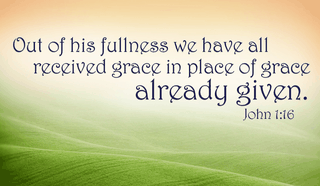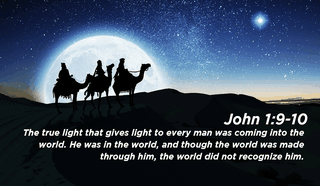
- Recent Translations
- All Translations
Giovanni 1
Share
Settings
Giovanni 1 Commentary
Chapter 1
The apostle and evangelist, John, seems to have been the youngest of the twelve. He was especially favoured with our Lord's regard and confidence, so as to be spoken of as the disciple whom Jesus loved. He was very sincerely attached to his Master. He exercised his ministry at Jerusalem with much success, and outlived the destruction of that city, agreeably to Christ's prediction, ch. 21:22 . History relates that after the death of Christ's mother, John resided chiefly at Ephesus. Towards the close of Domitian's reign he was banished to the isle of Patmos, where he wrote his Revelation. On the accession of Nerva, he was set at liberty, and returned to Ephesus, where it is thought he wrote his Gospel and Epistles, about A. D. 97, and died soon after. The design of this Gospel appears to be to convey to the Christian world, just notions of the real nature, office, and character of that Divine Teacher, who came to instruct and to redeem mankind. For this purpose, John was directed to select for his narrative, those passages of our Saviour's life, which most clearly displayed his Divine power and authority; and those of his discourses, in which he spake most plainly of his own nature, and of the power of his death, as an atonement for the sins of the world. By omitting, or only briefly mentioning, the events recorded by the other evangelists, John gave testimony that their narratives are true, and left room for the doctrinal statements already mentioned, and for particulars omitted in the other Gospels, many of which are exceedingly important.
The Divinity of Christ. (1-5) His Divine and human nature. (6-14) John the Baptist's testimony to Christ. (15-18) John's public testimony concerning Christ. (19-28) Other testimonies of John concerning Christ. (29-36) Andrew and another disciple follow Jesus. (37-42) Philip and Nathanael called. (43-51)
Verses 1-5 The plainest reason why the Son of God is called the Word, seems to be, that as our words explain our minds to others, so was the Son of God sent in order to reveal his Father's mind to the world. What the evangelist says of Christ proves that he is God. He asserts, His existence in the beginning; His coexistence with the Father. The Word was with God. All things were made by him, and not as an instrument. Without him was not any thing made that was made, from the highest angel to the meanest worm. This shows how well qualified he was for the work of our redemption and salvation. The light of reason, as well as the life of sense, is derived from him, and depends upon him. This eternal Word, this true Light shines, but the darkness comprehends it not. Let us pray without ceasing, that our eyes may be opened to behold this Light, that we may walk in it; and thus be made wise unto salvation, by faith in Jesus Christ.
Verses 6-14 John the Baptist came to bear witness concerning Jesus. Nothing more fully shows the darkness of men's minds, than that when the Light had appeared, there needed a witness to call attention to it. Christ was the true Light; that great Light which deserves to be called so. By his Spirit and grace he enlightens all that are enlightened to salvation; and those that are not enlightened by him, perish in darkness. Christ was in the world when he took our nature upon him, and dwelt among us. The Son of the Highest was here in this lower world. He was in the world, but not of it. He came to save a lost world, because it was a world of his own making. Yet the world knew him not. When he comes as a Judge, the world shall know him. Many say that they are Christ's own, yet do not receive him, because they will not part with their sins, nor have him to reign over them. All the children of God are born again. This new birth is ( 1 Peter. 1:23 ) Spirit of God as the Author. By his Divine presence Christ always was in the world. But now that the fulness of time was come, he was, after another manner, God manifested in the flesh. But observe the beams of his Divine glory, which darted through this veil of flesh. Men discover their weaknesses to those most familiar with them, but it was not so with Christ; those most intimate with him saw most of his glory. Although he was in the form of a servant, as to outward circumstances, yet, in respect of graces, his form was like the Son of God His Divine glory appeared in the holiness of his doctrine, and in his miracles. He was full of grace, fully acceptable to his Father, therefore qualified to plead for us; and full of truth, fully aware of the things he was to reveal.
Verses 15-18 As to the order of time and entrance on his work, Christ came after John, but in every other way he was before him. The expression clearly shows that Jesus had existence before he appeared on earth as man. All fulness dwells in him, from which alone fallen sinners have, and shall receive, by faith, all that renders them wise, strong, holy, useful, and happy. Our receivings by Christ are all summed up in this one word, grace; we have received "even grace," a gift so great, so rich, so invaluable; the good will of God towards us, and the good work of God in us. The law of God is holy, just, and good; and we should make the proper use of it. But we cannot derive from it pardon, righteousness, or strength. It teaches us to adorn the doctrine of God our Saviour, but it cannot supply the place of that doctrine. As no mercy comes from God to sinners but through Jesus Christ, no man can come to the Father but by him; no man can know God, except as he is made known in the only begotten and beloved Son.
Verses 19-28 John disowns himself to be the Christ, who was now expected and waited for. He came in the spirit and power of Elias, but he was not the person of Elias. John was not that Prophet whom Moses said the Lord would raise up to them of their brethren, like unto him. He was not such a prophet as they expected, who would rescue them from the Romans. He gave such an account of himself, as might excite and awaken them to hearken to him. He baptized the people with water as a profession of repentance, and as an outward sign of the spiritual blessings to be conferred on them by the Messiah, who was in the midst of them, though they knew him not, and to whom he was unworthy to render the meanest service.
Verses 29-36 John saw Jesus coming to him, and pointed him out as the Lamb of God. The paschal lamb, in the shedding and sprinkling of its blood, the roasting and eating of its flesh, and all the other circumstances of the ordinance, represented the salvation of sinners by faith in Christ. And the lambs sacrificed every morning and evening, can only refer to Christ slain as a sacrifice to redeem us to God by his blood. John came as a preacher of repentance, yet he told his followers that they were to look for the pardon of their sins to Jesus only, and to his death. It agrees with God's glory to pardon all who depend on the atoning sacrifice of Christ. He takes away the sin of the world; purchases pardon for all that repent and believe the gospel. This encourages our faith; if Christ takes away the sin of the world, then why not my sin? He bore sin for us, and so bears it from us. God could have taken away sin, by taking away the sinner, as he took away the sin of the old world; but here is a way of doing away sin, yet sparing the sinner, by making his Son sin, that is, a sin-offering, for us. See Jesus taking away sin, and let that cause hatred of sin, and resolutions against it. Let us not hold that fast, which the Lamb of God came to take away. To confirm his testimony concerning Christ, John declares the appearance at his baptism, in which God himself bore witness to him. He saw and bare record that he is the Son of God. This is the end and object of John's testimony, that Jesus was the promised Messiah. John took every opportunity that offered to lead people to Christ.
Verses 37-42 The strongest and most prevailing argument with an awakened soul to follow Christ, is, that it is he only who takes away sin. Whatever communion there is between our souls and Christ, it is he who begins the discourse. He asked, What seek ye? The question Jesus put to them, we should all put to ourselves when we begin to follow Him, What do we design and desire? In following Christ, do we seek the favour of God and eternal life? He invites them to come without delay. Now is the ( 2 Corinthians. 6:2 ) is, wherever it be. We ought to labour for the spiritual welfare of those related to us, and seek to bring them to Him. Those who come to Christ, must come with a fixed resolution to be firm and constant to him, like a stone, solid and stedfast; and it is by his grace that they are so.
Verses 43-51 See the nature of true Christianity, it is following Jesus; devoting ourselves to him, and treading in his steps. Observe the objection Nathanael made. All who desire to profit by the word of God, must beware of prejudices against places, or denominations of men. They should examine for themselves, and they will sometimes find good where they looked for none. Many people are kept from the ways of religion by the unreasonable prejudices they conceive. The best way to remove false notions of religion, is to make trial of it. In Nathanael there was no guile. His profession was not hypocritical. He was not a dissembler, nor dishonest; he was a sound character, a really upright, godly man. Christ knows what men are indeed. Does He know us? Let us desire to know him. Let us seek and pray to be Israelites indeed, in whom is no guile; truly Christians, approved of Christ himself. Some things weak, imperfect, and sinful, are found in all, but hypocrisy belongs not to a believer's character. Jesus witnessed what passed when Nathanael was under the fig-tree. Probably he was then in fervent prayer, seeking direction as to the Hope and Consolation of Israel, where no human eye observed him. This showed him that our Lord knew the secrets of his heart. Through Christ we commune with, and benefit by the holy angels; and things in heaven and things on earth are reconciled and united together.

